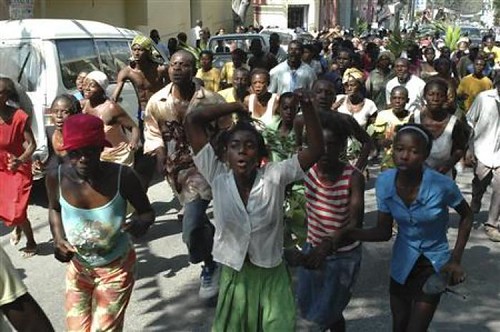
Haitians protest the lack of direct aid to the people of the Caribbean nation. An earthquake struck the country on Jan. 12, yet most people have not received the assistance they need., a photo by Pan-African News Wire File Photos on Flickr.
Havana. March 22, 2012
FROM HAITI
Another crisis tormenting Haiti
Amelia Duarte de la Rosa, Special correspondent
IF, for one moment, it is possible to imagine a Haiti which has not suffered earthquake and disease, a Haiti without centuries of plunder, indebtedness and dictatorships, there would still be another problem to overcome. The country is suffering such a degree of deforestation that experts say it is running the risk of becoming a desert.
With a total surface area of 27,750 square kilometers on the island of Hispaniola, the country – which formerly possessed rich and leafy forested land – only 2% of its territory is currently tree-covered. Desertification, the result of indiscriminate tree felling which began in the colonial era, represents one of the greatest problems in terms of food security for the majority of the population.
The causes of this disaster are basically the use of charcoal for cooking, forest fires, trading and contraband activities.
A report from the UN Development Program (UNDP) calculates that three quarters of the country’s energy demands are met using firewood and that 70% of Haitians use charcoal for cooking. The study also notes that the country’s forest reserves are disappearing at a rate of 15-20 million trees a year, which has transformed the country’s geography, in particular around Gonaives, in Artibonite department, and in parts of the northeast region.
As a consequence of this environmental problem, Haiti appears as one of the highest risk countries in the world.
Indiscriminate felling has resulted in the destruction of ecosystems, increased erosion (with the accompanying loss of 15 million cubic meters of cultivable land every year), soil instability, the disappearance of aquifer sources and the extinction or sedimentation of rivers.
Deforestation has also increased the devastating impact of tropical storms and torrential rain. Due to soil erosion, floods and landslides are more frequent, and the number of victims is also on the increase.
Although the dismantling of the environmental system is a serious problem, there are few short or medium-term strategies in place for solving it.
While national groups initiated tree planting programs some years back, the reconstruction plan drawn up by the Interim Haiti Recovery Commission – headed by former President William Clinton – and the U.S. Department of State report does not mention or show any interest in the possibility of reforestation.
However, the Haitian government does have a plan for mass tree replanting over the next five years. Agriculture Minister Hébert Docteur informed Granma that reforestation work is a challenge and a national problem. "We currently have an interesting program with Venezuela, but in any event, we need the support of many governments," he stated.
Although Haiti’s problems are many, solutions related to national restoration must be directed at long-term objectives which include environmental protection, reforestation programs and designing and implementing an energy policy in order to attain new economic opportunities for the country.
No comments:
Post a Comment